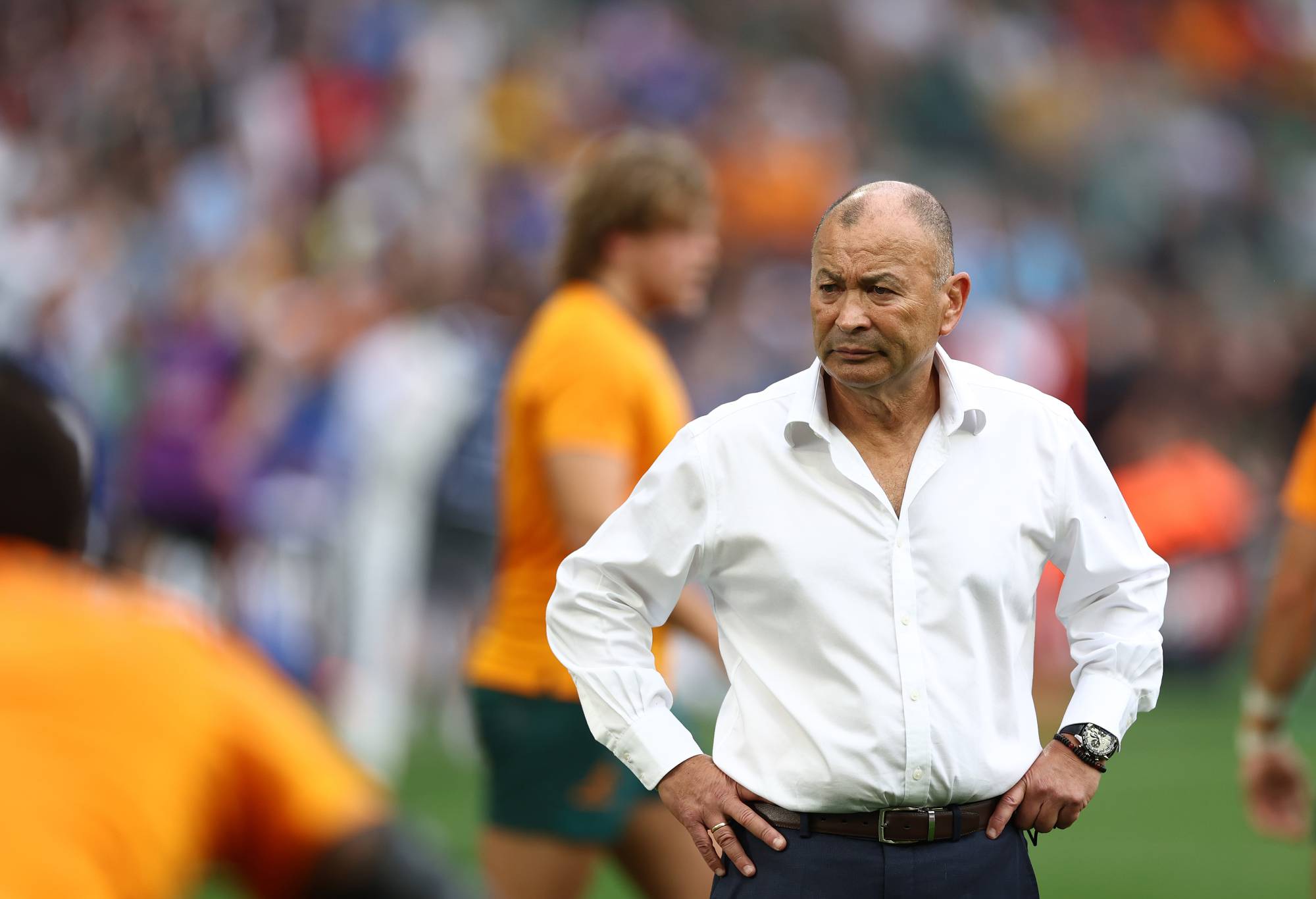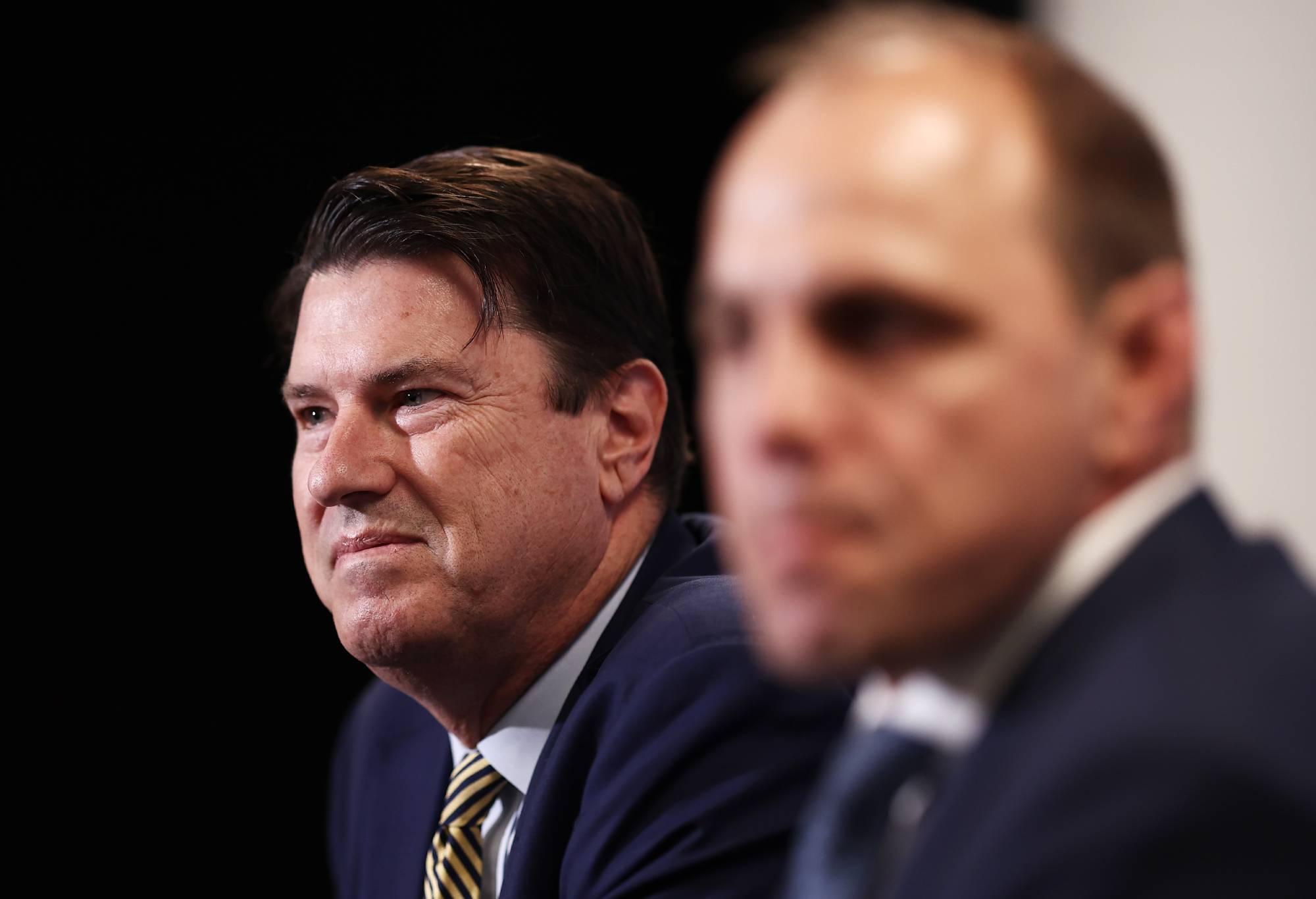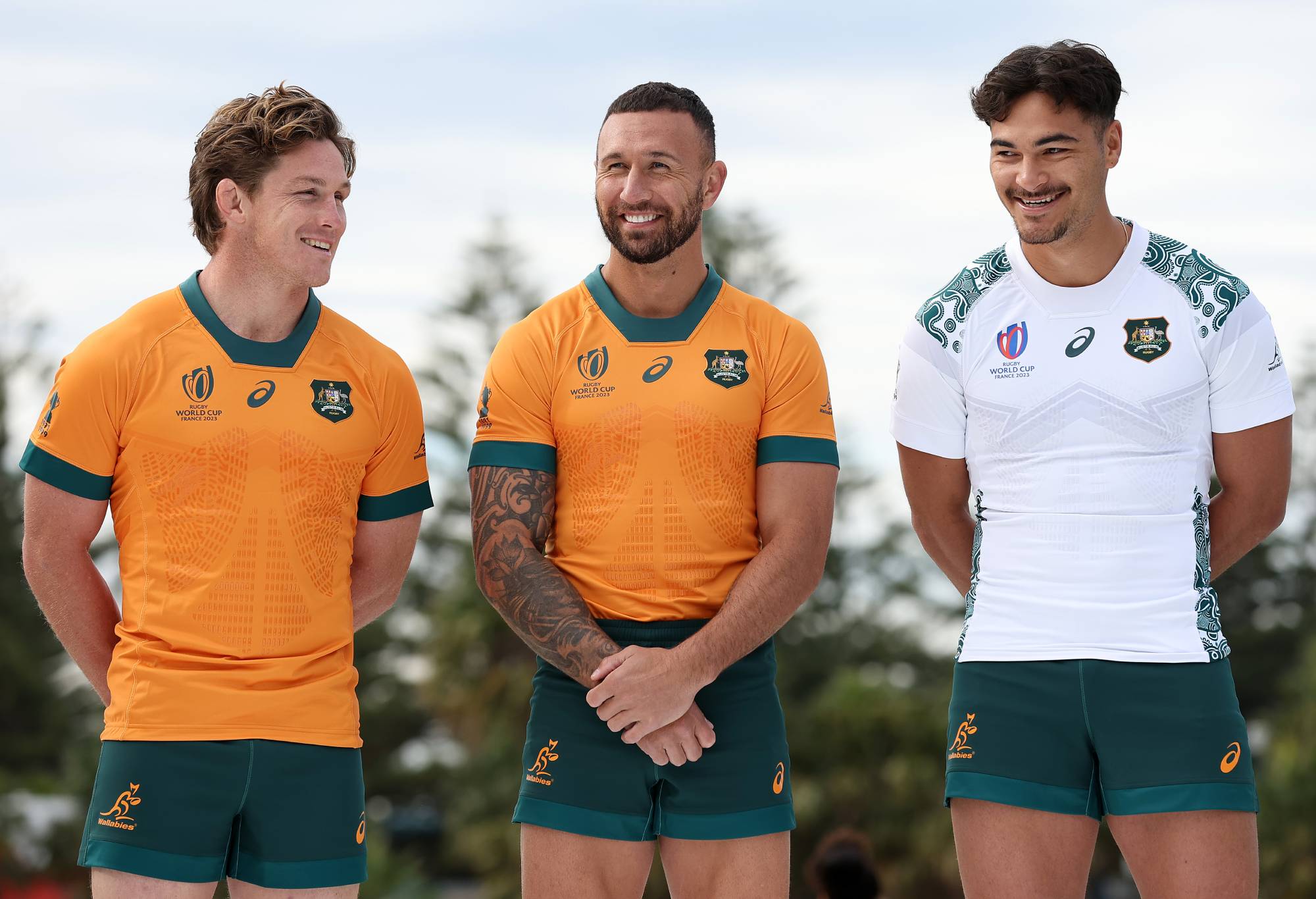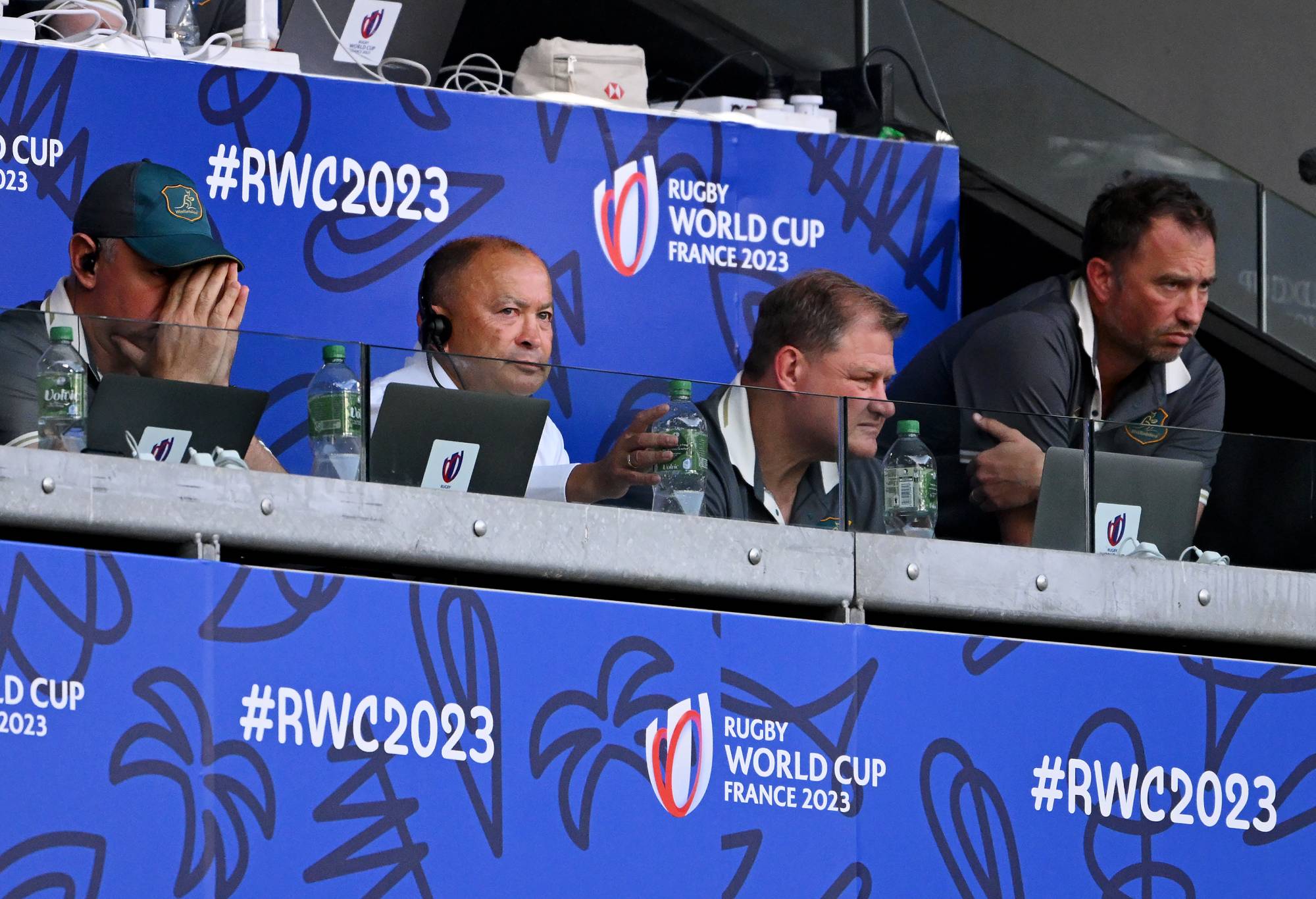PARIS – Back in early August Eddie Jones said that if aliens came down from Mars, they would have thought the Wallabies were dominating the All Blacks at times and could make a serious run at the World Cup.
Well, if those aliens did come down to see the Wallabies play in France they would have quickly left. After all, the Wallabies’ campaign was a slow-motion car crash that spiralled out of control as their historic first pool exit was confirmed on Monday morning AEDT despite Portugal producing the game of their lives to edge Fiji.
They wouldn’t have needed to venture far to see how the game could be played.
Nor was it just the big four – Ireland, France, New Zealand and South Africa – that played on a completely different level to the Wallabies, but the attack from rising nations like Portugal even rang rings around Jones’ side.
Indeed, Portugal made 10 linebreaks to the Wallabies five despite their 34-14 defeat in Saint Etienne.
As Portugal used the ball and found space from their opening offering inside the opening five minutes, all Jones’ side could muster was some barge the door efforts from Angus Bell and Rob Valetini first phase from set-piece.
While at times it proved effective against the so-called minnows, their inability to play with any creativity from set-piece ball was alarming.
Against Fiji and Wales, all the Wallabies could muster from set-piece play was Samu Kerevi crash balling it centre field. But there was no outdoing Warren-ball Gatland at his own game.
The Wallabies also played off nine often, and kicked away possession too regularly and too inaccurately. No wonder Carter Gordon retreated into his shell.
Jones has spoken regularly about the fact he thought the Wallabies needed a circuit breaker to stand a chance at this year’s World Cup because the status quo hadn’t led the fallen rugby nation anywhere.
He wasn’t wrong.
But by ushering through change, he broke every rule and rolled the dice hoping that the complete change of tack by picking young playmakers and novice rugby assistants, and playing an off-the-cuff brand of rugby, would pay off.
Yet, all it did was bite him in the backside.

Eddie Jones’ high risk plan of overhauling the Wallabies blew up in their face at the World Cup. (Photo by Chris Hyde/Getty Images)
There was not a single element of the Wallabies’ game that functioned well, with the set-piece crumbling under pressure, their attack non-existent with the exception of some strong individual efforts from Bell and Mark Nawaqanitawase, their defence desert them against Wales, including their breakdown work on both sides of the ball, while their kicking game was also found out.
Compare the Wallabies’ struggles to Ireland, who are soaring and look like one with each other with the way they attack and defend, hit rucks, run off shoulders and manipulate their opponents, and it is bleedingly obvious Jones’ side was miles off the pace.
Interestingly, Jones’ approach to picking up an underachieving Wallabies side and trying to turn their fortunes around was the complete opposite to what he did with England, where he made subtle changes and built on the fine work Stuart Lancaster had started.
With a very similar side, having made minor tweaks including a new captain, Jones led England to 17 straight victories after taking over from Lancaster.
Jones, of course, had less than nine months to prepare for the Wallabies’ World Cup opener. By the time he got his hands firmly on them by the end of June, he had less than three.
Andy Farrell has been with Ireland for eight years and head coach for half of those. Ditto his assistant Mike Catt.
Similarly, the All Blacks, Springboks and France are each bearing the fruit for their strong high-performance programs where their coaching staff has been stable and, crucially, their style of play ingrained for years.
Rugby Australia will be left to pick up the pieces and consider their next move.
The question is what does RA do with Jones?

Rugby Australia chairman Hamish McLennan and chief-executive Phil Waugh have some big decisions to make over the game’s future. (Photo by Matt King/Getty Images for Rugby Australia)
Sacking him would financially cripple the game even further.
The better question would be to ask the playing group, former players, as well as coaches, whether he can coach and still add value.
While his long-time sparring rival Sir Clive Woodward, who in an interview with The Sydney Morning Herald, said Jones had “hoodwinked” Rugby Australia like he had done so with the Rugby Football Union, the World Cup-winning coach acknowledged the Wallabies mentor was “fundamentally a good coach” and, indeed, “as a coach he is second to none”.
Woodward’s criticism of Jones was his management and leadership skills, as well as not picking a team for the now but tomorrow.
Yet, with the Wallabies to host the British and Irish Lions, Jones doesn’t have four years to try second second-guess himself.
Having waved goodbye to the likes of Quade Cooper and Michael Hooper, Jones sped up the usual post-World Cup mass exodus.

Neither Michael Hooper (L) nor Quade Cooper (C) made the Wallabies’ World Cup squad despite unveiling their Rugby World Cup jersey at Coogee Oval on June 22, 2023 in Sydney. (Photo by Cameron Spencer/Getty Images)
He now has the chance to build a squad over the next four years with the foundations already in place.
It was something he highlighted on Friday.
“I made the decision when I came in, I assessed the playing pool and said we need to make a change. And it was high risk,” Jones said.
“We catch one kick against Fiji and maybe we’re sitting here already qualified for the quarter-final. And they’re the small things that happened that can sometimes affect your obvious progress, but this team is going to be a good team.
“We need one or two quality players to add to it, we’re not the finished product yet, but if you look at the players Will [Skelton] mentioned and then you add in [Angus] Bell, 23, [Taniela] Tupou, Fraser McReight, [Rob] Valetini’s 25, Tate McDermott’s 25, [Ben] Donaldson, Mark Nawaqanitawase, [Max] Jorgensen … you’re now talking about 8 or 10 players that have the potential to be really good Test players and now you’re talking about a team.
“Then you add in a few experienced players like Will, Richie Arnold, a couple of hard guys like [Samu] Kerevi and you get those guys back to their best, that’s a team that can do really well.”
Jones is quite right, there is a talented group in Australia, but it is whether Rugby Australia can develop and nurture the generation coming through that will determine whether the Wallabies can return to past glories.
In recent years, Jones has churned through players and coaches in the blink of an eye.
Can he do the same with the playing pool significantly smaller in Australia that in England?
If he does the same, there will be no one left.
Ditto Jones’ coaching staff, especially given the circus and mad scientist approach he took in 2023 which exploded in his face.
Most will already be leaving, with rising forwards coach Dan Palmer to join Dan McKellar at Leicester, Jason Ryles (attack) joining the Melbourne Storm and Pierre-Henry Broncan (maul) staying in Europe.
Where that leaves Neal Hatley (forwards), Brett Hodgson (defence) and David Rath (learning coordinator) remains to be seen.

Eddie Jones has a big building mission ahead if he is to stay Wallabies coach, including fixing up his coaching team. (Photo by Laurence Griffiths/Getty Images)
Contrary to the perception no one wants to work with Jones, he still has many supporters and coaches itchy to learn and get opportunities at the international level.
As one respected coach recently told the Roar, “Eddie is the man – he just needs to sort out the rest of the stuff.”
Few coaches would turn down the chances of being involved in a Lions series and home World Cup.
The playing group, despite raising some eyebrows about the direction he chose, largely remains behind him, too.
That’s no surprise given it was Jones who backed the next generation coming through, but his positivity and demeanour, as well as his rich understanding of the game, is respected widely.
However, telling the Australian public – and its stakeholders – that won’t appease those wanting accountability.
Indeed, Australian rugby fans want blood.
But all that will achieve is a band-aid solution and risk alienating another rugby figure with intellectual property the game Down Under can’t afford to lose.
What RA should instead do is come clean with their reviews, take the public along with them and follow the lead New Zealand Rugby made in 2007 when, after more World Cup disappointment, they chose not to throw the toys out of the cot but rather reform and improve their pathway system.
By doing so, the NZR tapped into the provinces, went on scout missions and upskilled the next generation and ensured that they rowed in one boat rather than sailed off in different directions. It’s something former Wallabies assistant Mick Byrne said RA must do, having helped implement the NZR’s centralisation program.
RA must do the same, with RA chairman Hamish McLennan holding a crucial role in bringing everyone to the party without holding some stakeholders to ransom.
Already they are willing to come to the party from a high-performance perspective, but concessions must be made elsewhere otherwise the infighting and politicking will continue.
If they do that, RA and, indeed, the Wallabies can dig their way out of their mess over the coming years.
































































































